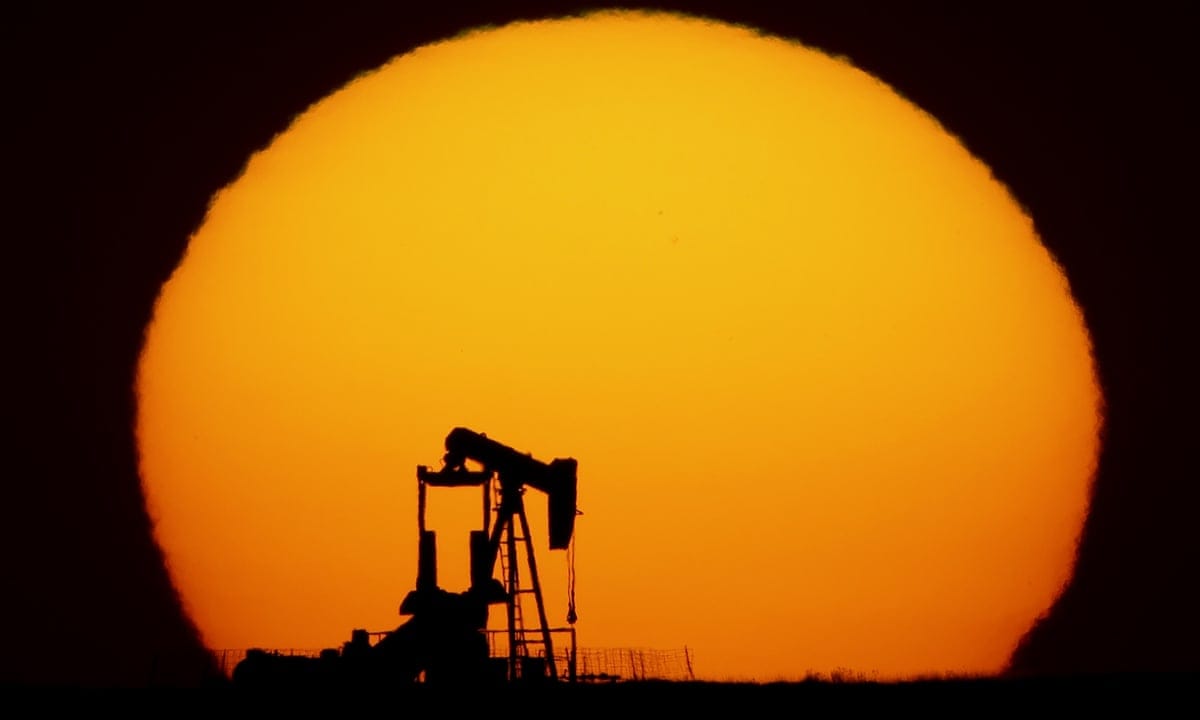According to a recent report from an oil corporation, it is anticipated that global demand for oil will reach its peak within the coming year, leading to a halt in escalating carbon emissions by mid-2025. This projection comes amidst a surge in renewable energy sources such as wind and solar power.
The report suggests an increase of approximately two million barrels per day, with oil usage projected to peak around 102 million barrels daily by 2025, based on the company's analysis. Two different forecasts were presented in the report: one representing the current path of energy transition and the other envisioning a route towards achieving global net-zero targets by 2050.
In both scenarios, it is predicted that carbon emissions will reach their highest point during the middle part of this decade due to an accelerated growth in wind and solar power production, along with declining costs for renewable energy technologies.
However, there are significant differences outlined by the report concerning future demand for gas. A net-zero scenario would see a peak in gas use around mid-decade before halving by 2050 compared to 2022 levels. Conversely, under current trends, gas usage is projected to increase throughout this forecast period with an expected growth of approximately one fifth by 2050.
Liquefied natural gas (LNG) demand shows a substantial climb in both scenarios, rising by over 30% and 40%, respectively, above current levels. The report also raises concerns about higher-than-anticipated oil consumption during the 2030s compared to previous forecasts, which could pose significant challenges to global climate targets.
The company's analysis of the current trajectory suggests that if existing climate policies continue unchanged, it would result in a breach of carbon budgets aimed at keeping global temperatures from increasing by more than 2 degrees Celsius above pre-industrial levels. Under this trajectory, oil demand is expected to decrease slightly but still remain high in the coming years, while under the net-zero scenario, it would gradually decline over time.
The company acknowledged criticism following a decision to adjust its pledge to reduce oil and gas production by 40% compared to 2019 levels due to fluctuations in energy market prices caused by geopolitical events such as the invasion of Ukraine.
The findings from the report have raised concerns about whether the global shift away from fossil fuels is slowing down, especially with rising energy demand in developing countries. The company's chief economist emphasized that during this "energy addition phase," both low-carbon and traditional energy sources are experiencing an increase in consumption.
BP projects a substantial growth in wind and solar power capacity over the next few decades. Increased investments in renewable energy infrastructure, particularly in China and developed economies, will be responsible for most of this expansion under both scenarios presented by the company's report. This surge in clean energy production is expected to drive further reductions in costs, leading to a higher rate of adoption of these technologies worldwide.
Read next

Ryanair plane had only six minutes of fuel upon Manchester landing, records show
Flight Narrowly Avoids Disaster After Storm Diversion
An inquiry has been launched after a Ryanair flight, struggling against severe winds during storm Amy last week, landed at Manchester Airport with only six minutes’ worth of fuel remaining.
The aircraft had been transporting passengers from Pisa, Italy, to Prestwick, Scotland, on

"Qantas customer data for 5 million exposed as hackers release info post-ransom deadline"
Hackers Leak Personal Data of 5 Million Qantas Customers on Dark Web
A cybercriminal group has released personal records of 5 million Qantas customers on the dark web after the airline did not meet their ransom demand.
The breach is part of a larger global incident affecting over 40 companies,

Investors flee record-high UK stocks as EU set to hike steel tariffs
Investors Withdraw Record Sums from Equity Funds Amid High Market Valuations
Data reveals that investors in the UK have withdrawn an unprecedented amount of money from equity funds over the past three months, driven by concerns over soaring stock market valuations.
According to the latest figures from Calastone, the largest

